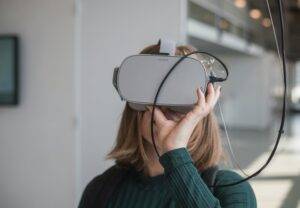Finding Balance Through VR/AR Immersive Meditation
Virtual reality (VR) and augmented reality (AR) are often associated with gaming and entertainment. However, these emerging technologies also have the potential to transform the way we practice mindfulness and meditation. Immersive meditation apps are using VR and AR to create deeply relaxing experiences that promote focus, presence, and emotional well-being.
Immersing the Senses
In a traditional meditation practice, the aim is to quiet the mind by focusing on something like the breath. But thoughts inevitably creep in, and it’s easy to get distracted. VR and AR can help minimize disruptions by visually and audibly guiding the user into a deeply focused state.
For example, with a VR headset on, visual and audio cues can lead you through breathing exercises and body scans designed to calm the mind. Ambient nature sounds and peaceful music enhance the experience. Some apps even incorporate biofeedback by mirroring your heartbeat through visualizations. This real-time feedback helps reinforce a relaxed state.
VR and AR meditation apps can also place users in photorealistic simulations of serene natural environments. Imagine sitting by a tranquil lake surrounded by lush forests, with the sound of chirping birds in the distance. Or floating weightlessly through the starry vastness of space. By immersing all the senses, these simulated environments make it easy to let go of stress and experience profound relaxation.
Wearable devices like smartwatches and fitness trackers can also complement immersive meditation by monitoring heart rate variability and other biometrics. This data can help guide personalized meditations and quantify their impacts.
Benefits of Immersive Meditation
The degree of presence and immersion possible with VR and AR meditation has many purported benefits. Studies show it can lower blood pressure, reduce anxiety and depression, and help manage pain. It also simply provides a convenient way to fit meditation into a busy day. Just put on a headset for 10 minutes of guided relaxation at home, work or on the go.
While apps aim to provide calming experiences, they also risk overstimulating some users. Those new to meditation may find the environments distracting at first. Fortunately, many apps allow you to customize the degree of stimulus to find the right balance.
The Future of VR/AR Meditation
We’ve only scratched the surface of immersive meditation’s potential. As VR and AR technology improves, so too will the ability to create personalized experiences that optimally reduce stress and nurture well-being. Mindfulness meditation helps people live with intention. Immersive technologies could play a big role in making the practice more accessible and effective.
Conclusion
Immersive VR and AR meditation experiences are poised to transform mindfulness practices. Though still an emerging area, early research and user feedback are promising. With further refinement of these technologies and apps, immersive meditation could soon become a popular tool for reducing stress, increasing focus, and supporting mental health.
Fizen™
Interested in learning more? Contact us today, and let’s reshape the future, together.
